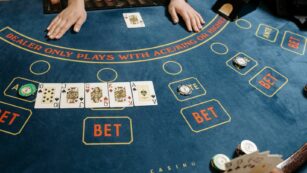Gambling behavior psychology delves into the intricate ways individuals engage with games of chance. It explores the motivations behind why people gamble, the emotional highs and lows they experience, and the cognitive biases that can lead to risky decisions. Understanding these psychological factors is crucial for both players and professionals in the gambling industry.
Gambling Behavior Psychology
Gambling behavior psychology examines the motivations, emotional states, and cognitive biases that drive individuals to engage in gambling activities. Understanding these factors provides insights for players and industry professionals alike, given the rising accessibility of gambling platforms.
Importance of Studying Gambling Psychology
 Studying gambling psychology offers crucial insights into player behavior and potential risks associated with gambling.
Studying gambling psychology offers crucial insights into player behavior and potential risks associated with gambling.
-
Identifying triggers: Understanding the psychological triggers that lead individuals to gamble promotes awareness of their actions.
-
Enhancing responsible gambling practices: Knowledge of psychological influences aids in developing responsible gambling tools and strategies.
-
Reducing addiction rates: Exploring the roots of gambling addiction helps devise effective prevention and intervention methods.
-
Shaping industry policies: Insights into player behavior contribute to creating regulations that protect individuals from harmful gambling practices.
-
Supporting mental health: Studying gambling behavior enhances support mechanisms for individuals struggling with gambling-related issues.
Factors Influencing Gambling Behavior
Gambling behavior is influenced by a variety of factors that shape individual experiences and decision-making. Understanding these influences is crucial in addressing issues related to gambling and promoting responsible practices.
Psychological Factors
 Psychological factors significantly impact gambling behavior. Individuals often engage in gambling as a form of escape from stress or emotional pain. Compulsive gambling may arise from underlying mental health issues, such as anxiety or depression. Cognitive distortions, including the illusion of control and gambler’s fallacy, also play a critical role. These distortions lead individuals to believe they can predict outcomes or influence results.
Psychological factors significantly impact gambling behavior. Individuals often engage in gambling as a form of escape from stress or emotional pain. Compulsive gambling may arise from underlying mental health issues, such as anxiety or depression. Cognitive distortions, including the illusion of control and gambler’s fallacy, also play a critical role. These distortions lead individuals to believe they can predict outcomes or influence results.
Another key psychological influence involves reinforcement and reward. The anticipation of winning generates excitement and dopamine release, which strengthens gambling habits. The desire for social approval or belonging may also drive individuals to gamble. Players often seek validation within a community that shares similar interests in games of chance, reinforcing their behavior. Understanding these psychological factors aids in developing effective interventions for problem gambling.
Theories Related to Gambling Behavior
Cognitive Behavioral Theory
Cognitive behavioral theory (CBT) focuses on how thoughts influence behaviors. It posits that gamblers often develop cognitive distortions, such as overestimating their chances of winning or believing they can control random outcomes. CBT aims to identify and correct these harmful thought patterns to promote healthier gambling behaviors.
Theories of Addiction and Motivation Theories
 Theories of addiction examine the compulsion driving gambling behaviors. The disease model suggests that gambling addiction functions similarly to substance abuse disorders, indicating that individuals may experience changes in brain chemistry and function. The biopsychosocial model considers biological, psychological, and social factors, highlighting how interactions between these elements contribute to gambling addiction’s development.
Theories of addiction examine the compulsion driving gambling behaviors. The disease model suggests that gambling addiction functions similarly to substance abuse disorders, indicating that individuals may experience changes in brain chemistry and function. The biopsychosocial model considers biological, psychological, and social factors, highlighting how interactions between these elements contribute to gambling addiction’s development.
Motivation theories focus on what drives individuals to gamble. The arousal theory posits that excitement and adrenaline associated with gambling motivate individuals. The social learning theory emphasizes the influence of social environments and observations of others’ behaviors, indicating that individuals learn gambling behavior through modeling and reinforcement.
Risk and Reward Theory
Risk and reward theory examines how individuals perceive potential losses and gains. This theory suggests that the allure of high rewards can outweigh the perceived risks, leading to continued gambling behavior despite negative consequences. The concept of delayed gratification plays a role, where individuals prioritize immediate rewards over long-term risks.
Theories of Compulsive Behavior & Social and Cultural Influences
 Theories of compulsive behavior explore the psychological symptoms that lead to excessive gambling. The impulsivity theory indicates that people with higher impulsivity levels may engage in gambling more frequently. Moreover, the emotional regulation theory suggests that some individuals gamble to manage negative emotions, using gambling as a coping mechanism.
Theories of compulsive behavior explore the psychological symptoms that lead to excessive gambling. The impulsivity theory indicates that people with higher impulsivity levels may engage in gambling more frequently. Moreover, the emotional regulation theory suggests that some individuals gamble to manage negative emotions, using gambling as a coping mechanism.
Social and cultural influences shape gambling behavior significantly. Social conformity theory demonstrates how the desire to fit in can prompt gambling. Cultural factors, including societal norms around gambling, also dictate individual participation rates and attitudes toward gambling as a leisure activity.

